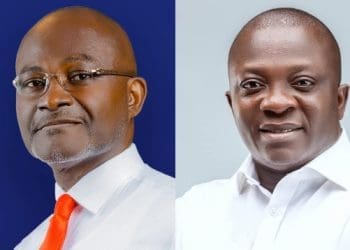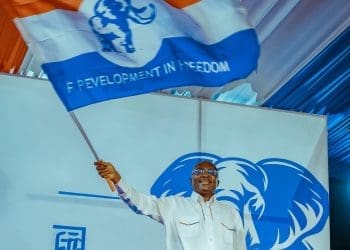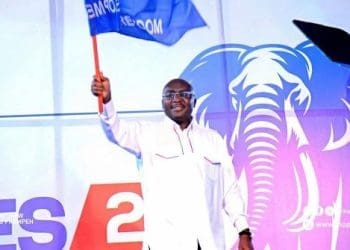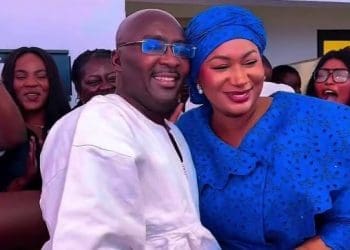More than six months after Ghana’s 2024 general elections, the collation of parliamentary results in some few polling stations in the Ablekuma North Constituency remains incomplete, stoking political tension and public frustration.
The Electoral Commission (EC) has ruled out a re-run for now, asserting that results from three outstanding polling stations can still be collated.
However, it blames the prolonged delay on the lack of legal clarity from the Attorney General’s Department and the resulting absence of security support from the Ghana Police Service.
Addressing Parliament, Deputy Chairperson of the EC in charge of Corporate Affairs, Dr. Bossman Asare, explained that while the Commission is fully prepared to complete the collation process, it is being held back by the Police who have refused to provide security without legal guidance from the Attorney General.
“So, for Ablekuma North, we have not reached the point where we will say we don’t have the results. When we try and we cannot get the results, that is when we will resort to the re-run. The re-run will be a last option,” Dr. Asare told lawmakers.
A trail of missed dates and legal deadlocks
Dr. Asare walked Parliament through a timeline of efforts made by the EC since the elections.
He revealed that on March 28, 2025, the Commission wrote to the Ghana Police Service, informing them of the three polling station results still outstanding and requesting a meeting with the Election Security Taskforce to agree on a date for completing the collation.
A follow-up meeting scheduled for April 10 was postponed after the Inspector General of Police (IGP) travelled to Bawku in response to a conflict.
On May 2, 2025, the Commission again wrote to the Election Security Taskforce proposing a meeting on May 8.
That meeting was held, and a new collation date was set for May 15 at the EC’s old quarters.
However, just two days before the scheduled exercise, the Police invited the EC to another meeting on May 13, where they disclosed that a legal case involving Ablekuma North was pending before the Supreme Court.
As such, they said providing security for the collation might amount to contempt of court.
The EC immediately responded in writing on May 15, clarifying that no injunction or court order existed barring the completion of the process.
It requested protection and proposed a follow-up meeting on May 16.
The Commission was then informed that the matter had been referred to the Attorney General for legal advice, and that the Police and the National Security Taskforce would act only upon receipt of formal advice.
“…In the letter, the commission requested a meeting the next day, that is 16th May, to agree on a date for the completion of the election,” Dr. Asare recounted.
“The National Police Service and the National Security Taskforce in a response informed the commission that the issue of the completion of the collation of the Ablekuma North election has been referred to the Office of the Attorney General and Ministry of Justice for legal advice and further stated that because of the referral the National Security Taskforce will hold on until the legal advice is received.”
EC appeals to Parliament for security intervention
Frustrated by the repeated delays and legal hurdles, the EC has now formally appealed to Parliament to intervene.
Dr. Asare stressed that while the Commission is determined to ensure transparency and accountability, it cannot proceed without the protection of law enforcement.
“Mr. Speaker, the collation has been transparent. As a Commission, we are desirous of ensuring that the people of Ablekuma North have a representation in Parliament,” he said. “We urge this Honourable House to assist us in getting the support of the Ghana Police Service to provide the requisite protection to enable us complete this collation exercise.”
He reiterated the Commission’s commitment to a fair process and affirmed that the agents of the two main political parties, the New Patriotic Party (NPP) and the National Democratic Congress (NDC), as well as the media, were present at every stage of the process.
According to him, all parties had agreed to use scanned pink sheets, and party agents had endorsed the materials used.
Millions spent on ballot printing
In an additional revelation, Dr. Asare disclosed that the Electoral Commission spent GH₵3.6 million on the reprinting of presidential ballots and GH₵2.4 million on parliamentary ballots for the Eastern and Western Regions during the 2024 general elections. While unrelated to the Ablekuma North impasse, this disclosure was made in response to broader questions from Parliament about the Commission’s expenditures and operational challenges during the elections.
Constituents left in political limbo
The failure to complete the collation has left the people of Ablekuma North without a duly declared Member of Parliament, despite voting in the December 2024 elections.
The unresolved status has become a source of growing frustration for constituents and political actors alike, especially as it threatens to set a dangerous precedent in Ghana’s electoral process.
Dr. Asare’s address was meant to bring clarity to a matter that has remained in the shadows for months.
However, the continued delay from the Attorney General’s Department and the refusal of the Police to act without legal direction means that the completion of collation in Ablekuma North remains indefinitely stalled.
The EC maintains that a re-run is not yet necessary and insists that the results from the three remaining polling stations can be processed and declared once security clearance is provided.
But until the legal bottleneck is cleared, Ghana’s electoral commission—and the people of Ablekuma North—remain at a standstill.












